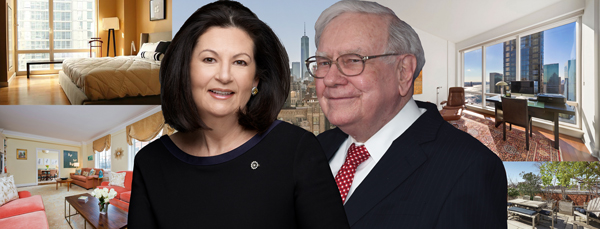Ellie Johnson, tasked with overseeing Berkshire Hathaway HomeServices’ entry into New York City, sees the Oracle of Omaha as her silver bullet.
“People have called me and said, ‘We would like you to come and appraise our home — we’re thinking of selling and we love Warren Buffett, we love the brand, we love what it stands for,’” Johnson said in a recent interview with The Real Deal. In her telling, the phone has been “ringing off the hook,” with agents eager to work there and clients keen to do deals. The firm has also run advertisements announcing “one of the most admired names in business is now in the real estate business Right Here On Madison Avenue.”
But Berkshire NYC is walking down a path that few have navigated successfully. New York’s brokerage market has been ruthless to outsiders, humbling the likes of Coldwell Banker, Century 21 and other national powerhouses. Johnson, a veteran of Sotheby’s International Realty, has picked up 13 agents since launching in January, but has just five exclusive listings.
“I can tell you from experience, launching a brokerage in the city – regardless of the brand and the financing – is not easy. You need to be nimble,” said Engel & Volkers’ Stuart Siegel, who oversaw the Germany-based firm’s 2014 rollout in the city and worked with Johnson at Sotheby’s. “Ellie’s got a good challenge in front of her.”

Some of Berkshire HS’ exclusives, clockwise from top left: 520 East 86th Street, 46, 845 United Nations Plaza, 44C, 328 East 77th Street, 2B, 247 West 46th Street, 1003 and 252 Seventh Avenue, PH14X
The city has certainly seen its fair share of brokerage flame outs, particularly when it comes to out-of-towners. Coldwell Banker first came here in 1996, partnering with Hunt Kennedy, but ended that experiment in 2009, millions in the red. It tried again in 2013, partnering with Neil Binder’s Bellmarc Group. That ended in December 2014, when Coldwell Banker severed its ties with the struggling brokerage. Others have survived but not thrived; Century 21, for example, has a strong foothold in Queens, but never competed in Manhattan. And firms starting from scratch here have experienced difficulty staying afloat in a market dominated by a handful of megaplayers and well-capitalized boutique firms.
“Nobody has come into this market and blown it out of the water,” said Kathy Braddock, managing director of William Raveis NYC, another firm that initially struggled to find momentum here.
New Yorkers don’t take well to “big box brands,” she added. Still, she thinks that whether or not Berkshire NYC does real business, the move will benefit its overall brand. The company has been clear it wants to expand into western Europe, and being in Manhattan is important to meeting that goal.
“I don’t care if you are designer, or artist, or anybody,” Braddock said. “Most people want to have a presence in New York.”
Johnson dismisses any suggestion the company will face similar challenges to other firms trying to break into the city market, chiefly because she says she isn’t under the same level of pressure. The mothership, she said, “is supporting me financially and allowing me to grow my company organically.” It “didn’t decide to come into New York City yesterday,” she added. “This was a very thoughtful, long-term process for them.”
Buffett’s foray into residential brokerage began nearly 20 years ago, almost by accident. In 1999, he acquired MidAmerican Energy Holdings Company, which happened to own HomeServices of America.
Now part of Berkshire Hathaway Energy, HomeServices of America (HSA) is the majority owner of Real Living Real Estate, Prudential Real Estate and the Berkshire HS franchise networks. It’s not clear from public filings how much money HSA has put into acquisitions and expansion, but the company’s annual report showed HSA pulled in $225 million in earnings last year — up 18 percent from $191 million in 2015. In his most recent letter to investors released in February, Buffett referred specifically to HSA, saying the company has its sights set on acquiring “many realtors and franchisees” in the coming decade.
Berkshire HS has been expanding in the northeast, targeting a large presence in Westchester County through the acquisition of firms in Scarsdale, Larchmont, Eastchester and Rye. Johnson’s New York City office falls under the umbrella of Berkshire HS New England Properties/Westchester Properties.
New England Group CEO Candace Adams and Berkshire HS CEO Gino Blefari were not available to be interviewed for this story.
Just over a week after Berkshire NYC’s office opened, HSA picked up family-owned brokerage Houlihan Lawrence, the top player in Westchester, according to a recent TRD ranking. Those offices will continue to fly the Houlihan Lawrence flag, but the acquisition gives HSA over 1,000 agents across 30 offices in Westchester, Putnam, Dutchess counties in New York and Fairfield in Connecticut.
HSA CEO Ron Peltier said in January that Berkshire NYC is a “stake in the ground” and that his firm is eyeing other acquisitions in the city. Last month, New York City’s Doyle Auctioneers — which already has a relationship with several Berkshire HS offices — announced it would form a “strategic marketing partnership” with the New York City operation.
“Certainly, being part of Berkshire Hathaway, it’s a company with a lot of means. You have to always watch for participants in the market that are seeking to expand and thus pose a competitive threat,” said Anthony Paolone, a JPMorgan analyst who covers real estate stocks. “If you look for instance at Realogy — whether it’s Compass or Berkshire Hathaway’s business or any of the long standing participants — Realogy has really had to fight hard to keep market share in the last year. You’ve seen them respond with things like increased agent payouts and a greater focus on agent retention.” Just last week, the firm, parent company to Corcoran Group and Citi Habitats, announced it would soon be searching for a new CEO.
Others said that no matter the resources and track record outside, New York is its own beast.
“Berkshire Hathaway I really see as a company that sells real estate in other parts of America,” said Douglas Elliman’s Roger Erickson, who previously worked on Johnson’s team at Sotheby’s. It’s not yet clear to Erickson which, if any, niche market the firm is targeting, adding that there are already scores of brokers and firms chasing the bankable luxury sales. “It’s a company with deep pockets…. I’m very curious to see how it’s received.”
Siegel, of Engel & Volkers, agreed that Berkshire HS is best known for its work in suburban markets, and that it would need to work to craft its Big Apple message.
Starting a brokerage from the ground up is enormously attractive, but incredibly challenging, he said. “When [Ellie] came in at Sotheby’s she came into a mature business with an established brand and ownership,” he said. “Launching a new business, with an untested brand, requires an entirely different skill set. Only time will tell.”
